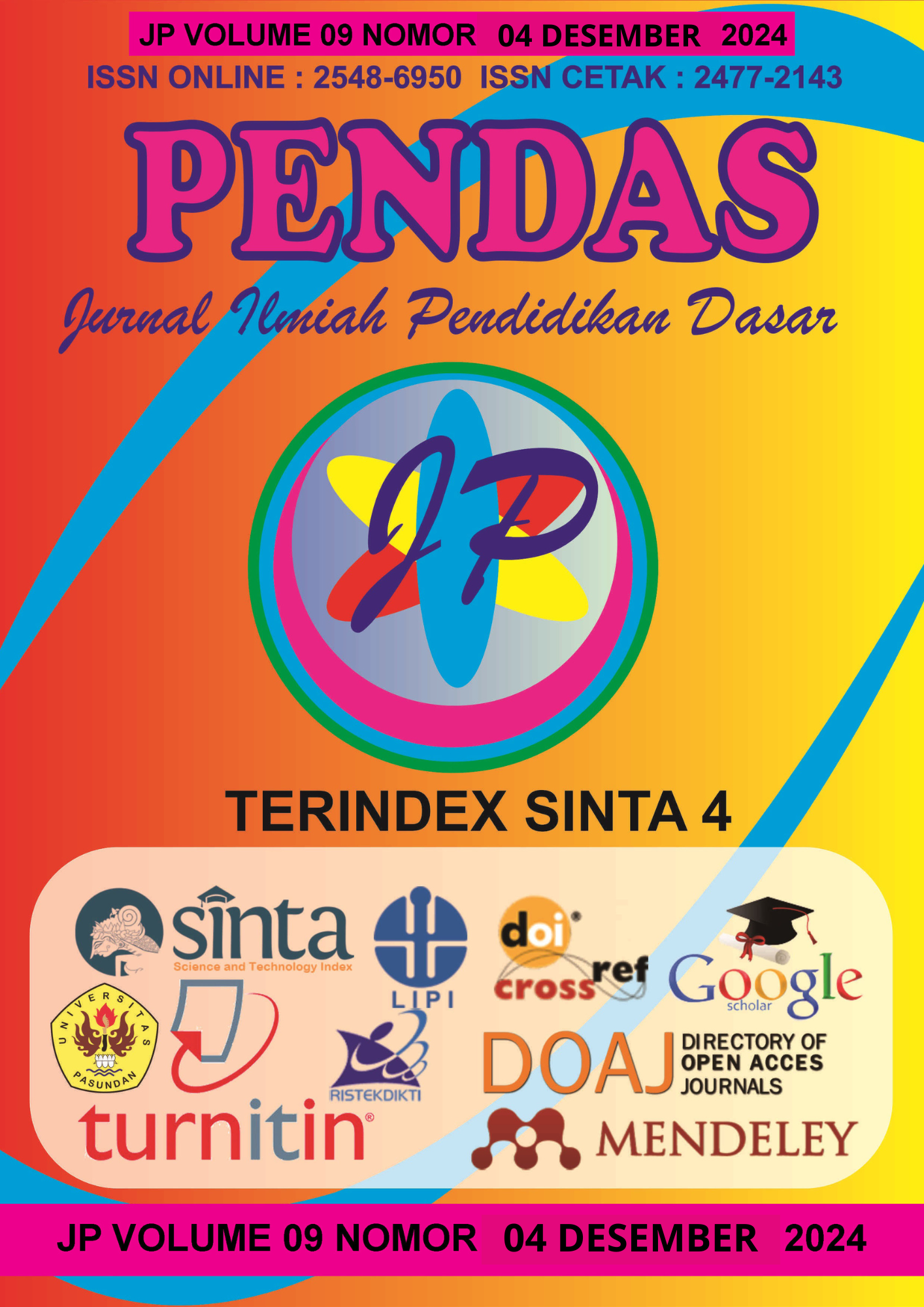KAJIAN AKSIOLOGI PEMEBELAJARAN BERBASIS DEEP LEARNING PADA PENDIDIKAN DASAR
DOI:
https://doi.org/10.23969/jp.v9i04.21041Keywords:
deep learning, aksiologi, pendidikan dasarAbstract
This study was motivated by public skepticism regarding the implementation of deep learning in education, particularly at the elementary level. The research aimed to examine the pedagogical benefits and ethical considerations of implementing deep learning through an axiological lens. A systematic literature review was conducted. The axiological analysis revealed that deep learning empowered students to develop a sense of belonging in their learning through critical thinking and reflection, fostering joyful, mindful, and meaningful learning experiences. The study highlights the importance of active, authentic, and collaborative learning, while also emphasizing the ethical considerations such as adaptability to digital learning environments and the quality of learning materials aligned with students' needs, interests, and life contexts.
Downloads
References
Agyeman, N. Y. B. (2024). Deep learning in high schools: exploring pedagogical approaches for transformative education. HUMANIKA, 24(2), 111–126. https://doi.org/10.21831/hum.v24i2.71350
Akaydın, B. B., Yorulmaz, A., & Çokçalışkan, H. (2020). Investigation of Primary School Students’ Metacognitive Awareness and Decision-Making Skill. International Journal of Progressive Education, 16(4), 157–171. https://doi.org/10.29329/ijpe.2020.268.10
Andrews, D., Van Lieshout, E., & Bhatta Kaudal, B. (2023). How, Where, And When Do Students Experience Meaningful Learning? International Journal of Innovation in Science and Mathematics Education, 31(3). https://doi.org/10.30722/IJISME.31.03.003
Anjeliani, S., Yanti, L. D., Aisyah, S., Saputra, M. R., Khoirunnisa, K., & Risdalina, R. (2024). Analisis Problematika Penerapan Kurikulum Merdeka di Sekolah Dasar. Jurnal Inovasi, Evaluasi Dan Pengembangan Pembelajaran (JIEPP), 4(2), 294–302. https://doi.org/10.54371/jiepp.v4i2.416
Bijsterbosch, E., van der Schee, J., & Kuiper, W. (2017). Meaningful learning and summative assessment in geography education: an analysis in secondary education in the Netherlands. International Research in Geographical and Environmental Education, 26(1), 17–35. https://doi.org/10.1080/10382046.2016.1217076
Ding, Y., & Li, Y. (2024). A study of preschool integration of deep learning to optimize the content of personalized education for young children. Applied Mathematics and Nonlinear Sciences, 9(1). https://doi.org/10.2478/amns-2024-2432
Entwistle, N., & Ramsden, P. (2015). Understanding Student Learning (Routledge Revivals). Routledge. https://doi.org/10.4324/9781315718637
Fadhilah, F. N., Nakhwa, I., Ahmad, F. R., Ivansyach, R. K., & Ridwan, R. (2024). TANTANGAN DAN REKOMENDASI DALAM IMPLEMENTASI KEBIJAKAN KURIKULUM MERDEKA UNTUK OPTIMALISASI PENDIDIKAN DI INDONESIA. Triwikrama: Jurnal Ilmu Sosial, 5(8). https://doi.org/https://doi.org/10.6578/triwikrama.v5i8.7305
Gunawan, I., & Bahari, Y. (2024). Problematika Kurikulum Merdeka Dalam Sudut Pandang Teori Struktural Fungsional (Study Literatur). Journal Of Human And Education (JAHE), 4(4), 178–187. https://doi.org/10.31004/jh.v4i4.1191
Hiğde, E., & Aktamış, H. (2022). The effects of STEM activities on students’ STEM career interests, motivation, science process skills, science achievement and views. Thinking Skills and Creativity, 43, 101000. https://doi.org/10.1016/j.tsc.2022.101000
Huang, Y.-M., Chiu, P.-S., Liu, T.-C., & Chen, T.-S. (2011). The design and implementation of a meaningful learning-based evaluation method for ubiquitous learning. Computers & Education, 57(4), 2291–2302. https://doi.org/10.1016/j.compedu.2011.05.023
Jeet, G., & Pant, S. (2023). Creating Joyful Experiences for Enhancing Meaningful Learning and Integrating 21st Century Skills. International Journal of Current Science Research and Review, 06(02). https://doi.org/10.47191/ijcsrr/V6-i2-05
Kovač, V. B., Nome, D., Jensen, A. R., & Skreland, L. L. (2023). The why, what and how of deep learning: critical analysis and additional concerns. Education Inquiry, 1–17. https://doi.org/10.1080/20004508.2023.2194502
Lee, E., & Hannafin, M. J. (2016). A design framework for enhancing engagement in student-centered learning: own it, learn it, and share it. Educational Technology Research and Development, 64(4), 707–734. https://doi.org/10.1007/s11423-015-9422-5
Lodge, J. M., Kennedy, G., & Lockyer, L. (2020). Digital Learning Environments, The Science of Learning, and the Relationship Between the Teacher and the Learner. In Learning Under the Lens. Routledge.
Mulyani, N. S. R. D., & Suardiman, S. P. (2019). Efektivitas Pendekatan Deep Learning Terhadap Kontrol Diri Remaja Dalam Menggunakan Internet. Scholaria: Jurnal Pendidikan Dan Kebudayaan, 9(3), 227–238. https://doi.org/10.24246/j.js.2019.v9.i3.p227-238
Mystakidis, S. (2021). Deep Meaningful Learning. Encyclopedia, 1(3), 988–997. https://doi.org/10.3390/encyclopedia1030075
Ningrum, R. C., & Pujiastuti, H. (2023). ANALISIS PERMASALAHAN GURU DALAM PENERAPAN KURIKULUM MERDEKA DI SEKOLAH DASAR. Pendas : Jurnal Ilmiah Pendidikan Dasar, 8(3). https://doi.org/https://doi.org/10.23969/jp.v8i3.11225
Ramachandran, K. K., Ravichand, M., Joshi, K., Vekariya, V., Saini, D., & Ponnusamy, R. (2023). Investigation of the Educational Performance on the Revolutionary Philosophical Electoral Online Learning Platform Centred on Deep Learning. In 2023 International Conference on Artificial Intelligence and Smart Communication, AISC 2023 (pp. 639–642). https://doi.org/10.1109/AISC56616.2023.10085556
Rosnawati, R., Ahmad Syukri, A. S., Badarussyamsi, B., & Ahmad Fadhil Rizki, A. F. R. (2021). Aksiologi Ilmu Pengetahuan dan Manfaatnya Bagi Manusia. Jurnal Filsafat Indonesia, 4(2), 186–194. https://doi.org/10.23887/jfi.v4i2.35975
Rozenszayn, R., & Ben-Zvi Assaraf, O. (2011). When Collaborative Learning Meets Nature: Collaborative Learning as a Meaningful Learning Tool in the Ecology Inquiry Based Project. Research in Science Education, 41(1), 123–146. https://doi.org/10.1007/s11165-009-9149-6
Tenenbaum, H. R., Winstone, N. E., Leman, P. J., & Avery, R. E. (2020). How effective is peer interaction in facilitating learning? A meta-analysis. Journal of Educational Psychology, 112(7), 1303–1319. https://doi.org/10.1037/edu0000436
Triska, & Ramadan, Z. H. (2024). PROBLEMATIKA IMPLEMENTASI KURIKULUM MERDEKA DI SDN 21 PEKANBARU. Pendas: Jurnal Ilmiah Pendidikan Dasar, 9(1). https://doi.org/https://doi.org/10.23969/jp.v9i1.13099
Wergin, J. F. (2019). Mindful Learning. In Deep Learning in a Disorienting World (pp. 38–56). Cambridge University Press. https://doi.org/10.1017/9781108647786.003
Wibawa, A. P., Dwiyanto, F. A., & Utama, A. B. P. (2022). Deep learning in education: a bibliometric analysis. Bulletin of Social Informatics Theory and Application, 6(2), 151–157. https://doi.org/10.31763/businta.v6i2.596
Downloads
Published
Issue
Section
License
Copyright (c) 2025 Pendas : Jurnal Ilmiah Pendidikan Dasar

This work is licensed under a Creative Commons Attribution 4.0 International License.














































